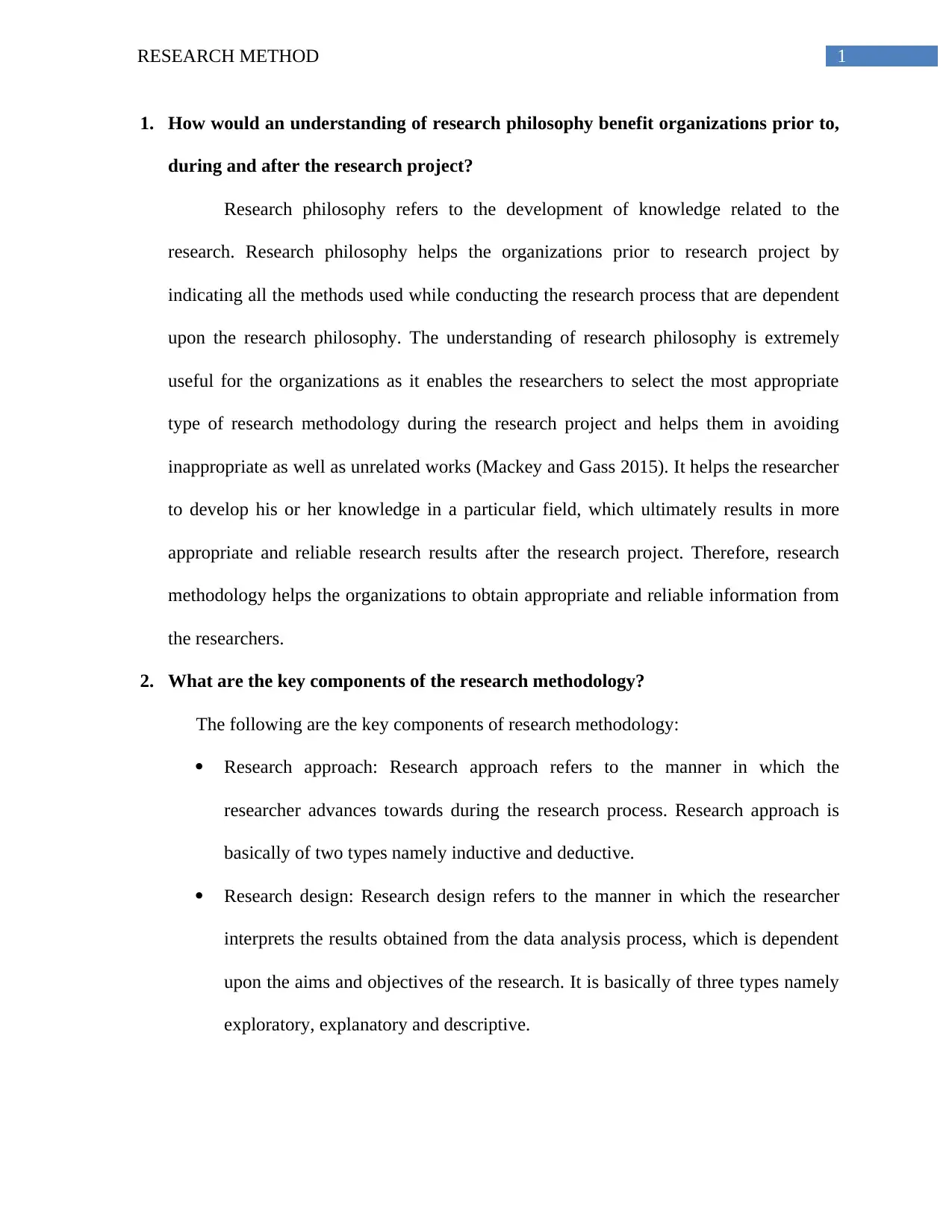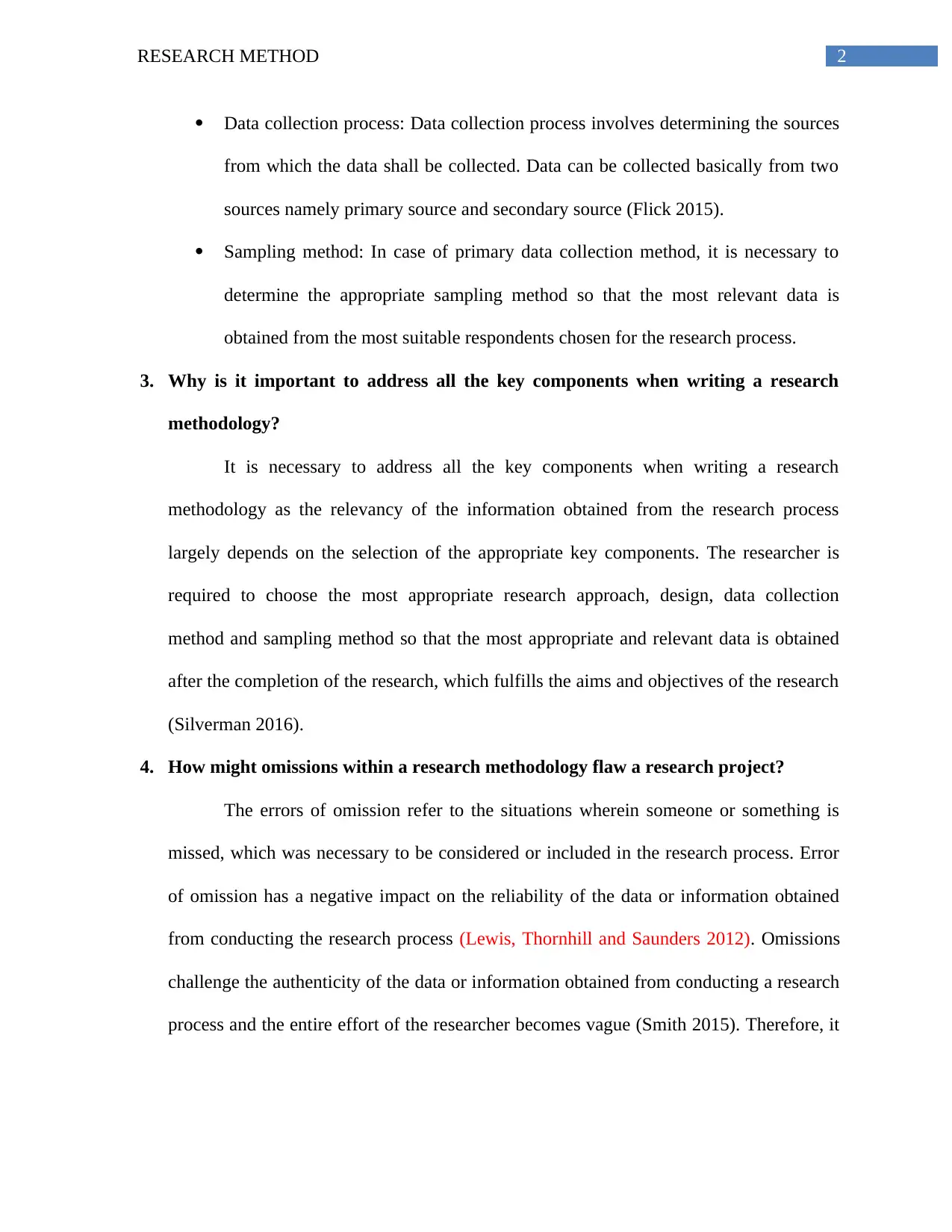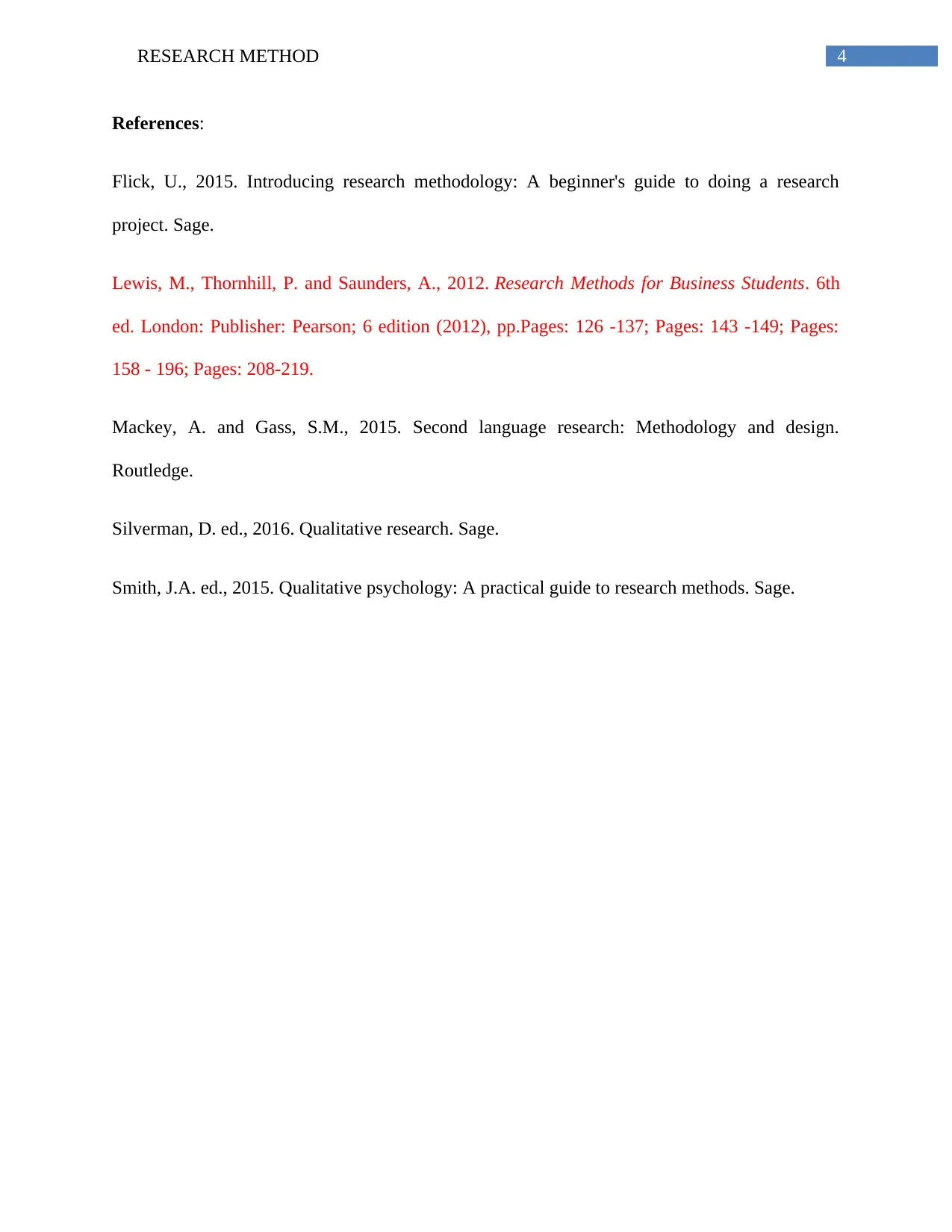Research Method Assignment: Philosophy, Components, and Errors
VerifiedAdded on 2020/05/16
|5
|722
|199
Homework Assignment
AI Summary
This assignment solution delves into the core concepts of research methodology, emphasizing the significance of research philosophy for organizations throughout the research process. It identifies and explains the key components of research methodology, including research approach, design, data collection, and sampling methods, highlighting their importance for obtaining relevant and reliable data. The solution also addresses the critical need to consider all key components when writing a research methodology to ensure the validity of the research and discusses how omissions within a research methodology can flaw a research project by impacting the authenticity and reliability of the obtained data. The document references several academic sources to support its analysis.

Running head: RESEARCH METHOD
Research method
Name of the student:
Name of the University:
Author note:
Research method
Name of the student:
Name of the University:
Author note:
Paraphrase This Document
Need a fresh take? Get an instant paraphrase of this document with our AI Paraphraser

1RESEARCH METHOD
1. How would an understanding of research philosophy benefit organizations prior to,
during and after the research project?
Research philosophy refers to the development of knowledge related to the
research. Research philosophy helps the organizations prior to research project by
indicating all the methods used while conducting the research process that are dependent
upon the research philosophy. The understanding of research philosophy is extremely
useful for the organizations as it enables the researchers to select the most appropriate
type of research methodology during the research project and helps them in avoiding
inappropriate as well as unrelated works (Mackey and Gass 2015). It helps the researcher
to develop his or her knowledge in a particular field, which ultimately results in more
appropriate and reliable research results after the research project. Therefore, research
methodology helps the organizations to obtain appropriate and reliable information from
the researchers.
2. What are the key components of the research methodology?
The following are the key components of research methodology:
Research approach: Research approach refers to the manner in which the
researcher advances towards during the research process. Research approach is
basically of two types namely inductive and deductive.
Research design: Research design refers to the manner in which the researcher
interprets the results obtained from the data analysis process, which is dependent
upon the aims and objectives of the research. It is basically of three types namely
exploratory, explanatory and descriptive.
1. How would an understanding of research philosophy benefit organizations prior to,
during and after the research project?
Research philosophy refers to the development of knowledge related to the
research. Research philosophy helps the organizations prior to research project by
indicating all the methods used while conducting the research process that are dependent
upon the research philosophy. The understanding of research philosophy is extremely
useful for the organizations as it enables the researchers to select the most appropriate
type of research methodology during the research project and helps them in avoiding
inappropriate as well as unrelated works (Mackey and Gass 2015). It helps the researcher
to develop his or her knowledge in a particular field, which ultimately results in more
appropriate and reliable research results after the research project. Therefore, research
methodology helps the organizations to obtain appropriate and reliable information from
the researchers.
2. What are the key components of the research methodology?
The following are the key components of research methodology:
Research approach: Research approach refers to the manner in which the
researcher advances towards during the research process. Research approach is
basically of two types namely inductive and deductive.
Research design: Research design refers to the manner in which the researcher
interprets the results obtained from the data analysis process, which is dependent
upon the aims and objectives of the research. It is basically of three types namely
exploratory, explanatory and descriptive.

2RESEARCH METHOD
Data collection process: Data collection process involves determining the sources
from which the data shall be collected. Data can be collected basically from two
sources namely primary source and secondary source (Flick 2015).
Sampling method: In case of primary data collection method, it is necessary to
determine the appropriate sampling method so that the most relevant data is
obtained from the most suitable respondents chosen for the research process.
3. Why is it important to address all the key components when writing a research
methodology?
It is necessary to address all the key components when writing a research
methodology as the relevancy of the information obtained from the research process
largely depends on the selection of the appropriate key components. The researcher is
required to choose the most appropriate research approach, design, data collection
method and sampling method so that the most appropriate and relevant data is obtained
after the completion of the research, which fulfills the aims and objectives of the research
(Silverman 2016).
4. How might omissions within a research methodology flaw a research project?
The errors of omission refer to the situations wherein someone or something is
missed, which was necessary to be considered or included in the research process. Error
of omission has a negative impact on the reliability of the data or information obtained
from conducting the research process (Lewis, Thornhill and Saunders 2012). Omissions
challenge the authenticity of the data or information obtained from conducting a research
process and the entire effort of the researcher becomes vague (Smith 2015). Therefore, it
Data collection process: Data collection process involves determining the sources
from which the data shall be collected. Data can be collected basically from two
sources namely primary source and secondary source (Flick 2015).
Sampling method: In case of primary data collection method, it is necessary to
determine the appropriate sampling method so that the most relevant data is
obtained from the most suitable respondents chosen for the research process.
3. Why is it important to address all the key components when writing a research
methodology?
It is necessary to address all the key components when writing a research
methodology as the relevancy of the information obtained from the research process
largely depends on the selection of the appropriate key components. The researcher is
required to choose the most appropriate research approach, design, data collection
method and sampling method so that the most appropriate and relevant data is obtained
after the completion of the research, which fulfills the aims and objectives of the research
(Silverman 2016).
4. How might omissions within a research methodology flaw a research project?
The errors of omission refer to the situations wherein someone or something is
missed, which was necessary to be considered or included in the research process. Error
of omission has a negative impact on the reliability of the data or information obtained
from conducting the research process (Lewis, Thornhill and Saunders 2012). Omissions
challenge the authenticity of the data or information obtained from conducting a research
process and the entire effort of the researcher becomes vague (Smith 2015). Therefore, it
⊘ This is a preview!⊘
Do you want full access?
Subscribe today to unlock all pages.

Trusted by 1+ million students worldwide

3RESEARCH METHOD
is necessary for the researchers to ensure that the research process is free from the error
of omission so that the authenticity and reliability of the research can be maintained.
is necessary for the researchers to ensure that the research process is free from the error
of omission so that the authenticity and reliability of the research can be maintained.
Paraphrase This Document
Need a fresh take? Get an instant paraphrase of this document with our AI Paraphraser

4RESEARCH METHOD
References:
Flick, U., 2015. Introducing research methodology: A beginner's guide to doing a research
project. Sage.
Lewis, M., Thornhill, P. and Saunders, A., 2012. Research Methods for Business Students. 6th
ed. London: Publisher: Pearson; 6 edition (2012), pp.Pages: 126 -137; Pages: 143 -149; Pages:
158 - 196; Pages: 208-219.
Mackey, A. and Gass, S.M., 2015. Second language research: Methodology and design.
Routledge.
Silverman, D. ed., 2016. Qualitative research. Sage.
Smith, J.A. ed., 2015. Qualitative psychology: A practical guide to research methods. Sage.
References:
Flick, U., 2015. Introducing research methodology: A beginner's guide to doing a research
project. Sage.
Lewis, M., Thornhill, P. and Saunders, A., 2012. Research Methods for Business Students. 6th
ed. London: Publisher: Pearson; 6 edition (2012), pp.Pages: 126 -137; Pages: 143 -149; Pages:
158 - 196; Pages: 208-219.
Mackey, A. and Gass, S.M., 2015. Second language research: Methodology and design.
Routledge.
Silverman, D. ed., 2016. Qualitative research. Sage.
Smith, J.A. ed., 2015. Qualitative psychology: A practical guide to research methods. Sage.
1 out of 5
Related Documents
Your All-in-One AI-Powered Toolkit for Academic Success.
+13062052269
info@desklib.com
Available 24*7 on WhatsApp / Email
![[object Object]](/_next/static/media/star-bottom.7253800d.svg)
Unlock your academic potential
Copyright © 2020–2026 A2Z Services. All Rights Reserved. Developed and managed by ZUCOL.





